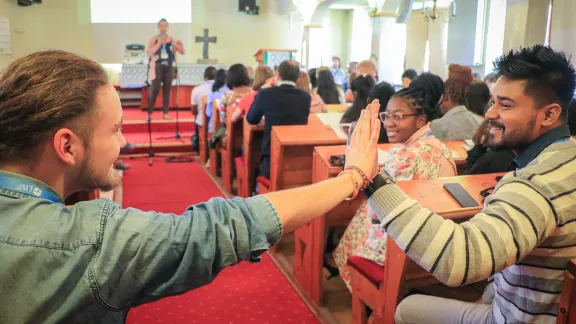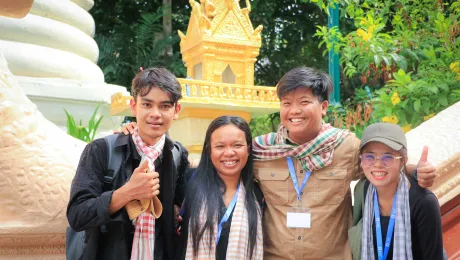From seminars and peace marches to environmental clean-ups, young Lutherans are joining hands with youth from other faith communities to promote peace through interreligious cooperation.

Youth delegates at the LWF Pre-Assembly in Poland in September 2023. Photo: LWF/J.C. Valeriano
LWF supports youth-led projects to promote interfaith cooperation in Africa, Asia and the Caribbean
(LWI) - Lutheran youth from countries around the globe are gathering with young women and men from other faiths to mark World Interfaith Harmony Week and to promote peacebuilding between their different religious traditions. Interfaith relationships and peacebuilding were two priorities identified by young Lutherans in a message to The Lutheran World Federation (LWF) Thirteenth Assembly in September.
LWF is supporting six youth-led interfaith projects in countries across Africa, Asia and the Latin American and Caribbean region. They include days of dialogue and training in Indonesia, India and Namibia, the production of interfaith audio-visual materials in Chile, a peace march in Suriname and an environmental clean-up activity in Madagascar.
Rev. Dr Sivin Kit, LWF director for Theology, Justice and Mission, said: “We are encouraged and inspired to witness the different ways in which youth are committed to promoting peace, combining interfaith activities with relevant issues that affect their communities. It is heartwarming to see such work springing up in different regions during this time when conflict and war dominate the news headlines."
Empowering youth in leadership
Each of the projects has been developed by young Lutheran leaders in cooperation with members of local schools, student communities or village groups. The goal is to empower young people to be proactive in peacebuilding and reconciliation, promoting relationships of trust among conflicting, or potentially conflicting communities.
In Suriname, an ethnically diverse country on the northern coast of South America, organizers note that there is full freedom of religion, yet young people generally avoid speaking about differences between their faith practices and traditions. About half the population is Christian, with Hindus making up over 20 percent and Muslims numbering a further 14 percent. Other religious communities include Bahai’, Jews, Buddhists, Brahma Kumaris, Rastafarians and other indigenous religions.
With around 4,000 members, the Evangelical Lutheran Church in Suriname is one of the smallest Christian churches in the country, but its youth has been reaching out to other faith communities to organize a five-kilometer ‘Peace Walk’ through the capital, Paramaribo. At the end of the walk, representatives of the various groups will deliver short statements about the importance of peaceful coexistence.
Peacebuilding and environmental protection
On the island of Madagascar, where Christians make up a large majority and the Malagasy Lutheran Church numbers over 4 million members, young people from different faith communities are leading activities to combat widespread plastic waste in the port city of Toamasina. The recycling project has been jointly sponsored by regional authorities dealing with the environment and sustainable development. Plastic waste will be collected in schools, churches and other public places, before being recycled into useful items to raise awareness about the importance of environmental protection.
In Sidikalang, a small town in Indonesia’s North Sumatra province, young Christians, Muslims and Buddhists are organizing a day-long interfaith seminar, beginning with shared worship and ending with an action plan to promote closer ties between the faith communities. Spearheaded by youth from four congregations of the Pakpak Dairi Christian Protestant Church, the discussions will focus on the importance of peacemaking within the different religious traditions.
World Interfaith Harmony Week, which is observed from 1 to 7 February each year, was adopted by the United Nations in 2010. All interfaith groups and organizations are encouraged to plan and register activities to take place between February and March, showcasing the work they are doing to promote dialogue and cooperation within their local, regional or national contexts.


